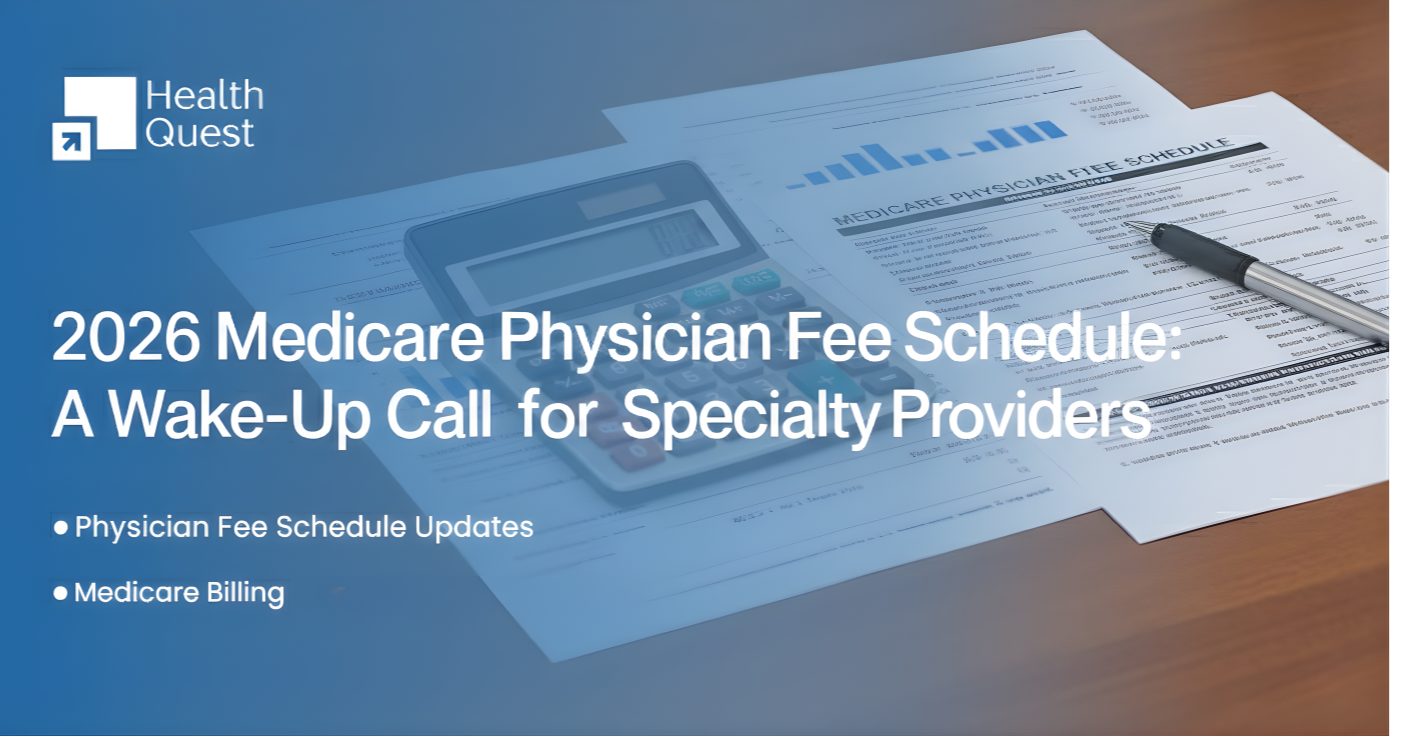October 31, 2025, The Centers for Medicare & Medicaid Services (CMS) released the final rule for the CY 2026 Medicare Physician Fee Schedule (PFS), setting in motion a series of reimbursement changes that will take effect January 1, 2026.
While CMS describes these updates as an effort to “improve payment accuracy and promote efficiency,” the reality for most specialty practices is more complex, lower reimbursement, shifting priorities, and tighter financial margins.
As healthcare costs climb and payer expectations grow, the 2026 rule signals one clear message: it’s time for practices to adapt their financial strategy before revenue erosion becomes inevitable.
What’s Changing in the 2026 Medicare Physician Fee Schedule (PFS)
Every year, CMS updates the Physician Fee Schedule to determine how much physicians are paid for the care they deliver. But the 2026 PFS stands out for its deeper structural adjustments.
The biggest headlines:
- A –2.5% “efficiency adjustment” across non–time-based services
- Redefined practice expense (PE) calculations, reshaping cost valuation
- Expanded coverage for chronic care and behavioral health services
- Revised policies for rural clinics, telehealth, and skin substitutes
In short, it’s not just another fee schedule update; it’s a reshaping of how Medicare defines value and efficiency.
Read: MIPS Penalties 2025: Provider’s Guide to Staying Compliant
A Shift Toward Preventive and Coordinated Care
Chronic Illness and Behavioral Health
CMS is prioritizing long-term care coordination and mental health access. New billing pathways for chronic care management (CCM) and behavioral health integration (BHI) services now allow practices to get paid for coordination time, follow-ups, and patient engagement.
This opens new revenue potential for primary care and behavioral health teams, but also requires accurate coding and documentation to ensure compliance.
Rural Health Clinics and FQHCs: Access Protected Through 2026
For Rural Health Clinics (RHCs) and Federally Qualified Health Centers (FQHCs), CMS extended telehealth flexibilities through December 31, 2026, allowing continued use of code G2025.
While this offers a temporary cushion, practices must begin preparing for post-pandemic payment parity phase-outs and updated encounter documentation to avoid claim denials once transitional rules expire.
Skin Substitutes: The New Challenge in Wound Care Billing
The 2026 PFS also finalizes CMS’s reclassification of skin substitutes, a policy shift with major financial implications for wound care, podiatry, and dermatology. Instead of receiving separate reimbursements, practices will now be paid under a packaged payment model combining product and procedural costs.
What this means:
- Skin substitutes will transition from Q-codes to A-codes (HCPCS Level II)
- Payments will be bundled under surgical supplies
- Practices will need precise inventory and cost tracking to prevent underbilling
Without strategic revenue analysis, many practices may not realize how this change impacts profitability until margins start to shrink.
Also read: The Hidden Cost of Medicaid Cuts
The Broader Financial Impact: Who Gains and Who Loses
The 2026 PFS attempts to maintain budget neutrality, which means increases in one area come at the expense of another.
Primary care sees small gains, but procedural and diagnostic specialties bear the brunt.
| Specialty | Estimated Change (2026) | Impact Summary |
| Radiology | –3.8% | Technical component reductions |
| Interventional Radiology | –4.2% | Equipment cost recalculations |
| Orthopedics | –3.5% | Continued procedural revaluation |
| Emergency Medicine | –2.9% | Adjustments on ER visit codes |
| Cardiology | –2.7% | Diagnostic and cath lab realignments |
| Pathology | –3.1% | Lower reimbursement for lab components |
| Primary Care | +1.3% | Modest gains tied to E/M codes |
For hospital-based and specialty practices, these cuts could translate to lower operating margins, increased denial rates, and tighter cash flow cycles.
Other Notable Updates: Drug Pricing and Efficiency
Medicare Drug Inflation Rebate Program
Beginning in 2026, CMS will enforce inflation-linked rebates for drug manufacturers under the Inflation Reduction Act (IRA). While it primarily targets pricing reform, it could influence future negotiations between payers and providers over physician-administered drugs.
The “Efficiency Adjustment” Reality
CMS’s –2.5% cut is meant to reflect “efficiency gains” in service delivery, but many specialists argue it penalizes complex procedures rather than rewarding them. For billing teams, this means closer tracking of RVU-based payments and more robust denial management will be critical to preserving revenue.
Why Practices Can’t Afford to Wait
The 2026 Medicare PFS doesn’t just change reimbursement rates; it changes how healthcare organizations must think about financial sustainability.
Ignoring these updates can result in:
- Delayed reimbursements and increased denials
- Missed opportunities in chronic and behavioral health billing
- Poor forecasting due to outdated RVU models
- Compliance risks from unaligned documentation
For practices relying heavily on Medicare revenue, proactive adaptation is no longer optional; it’s a competitive necessity.
How Health Quest Helps Practices Adapt and Stay Profitable
At Health Quest, we specialize in helping practices stay financially resilient in times of regulatory change. Our approach isn’t just about billing, it’s about financial strategy, compliance, and foresight.
We help you:
- Model the 2026 PFS impact across your top CPT codes
- Adjust coding workflows to capture every eligible reimbursement
- Strengthen telehealth and CCM billing accuracy
- Anticipate revenue shifts with advanced forecasting tools
Rather than reacting to change, our clients stay ready and confident that their revenue cycle aligns with every new CMS rule. Partner with Health Quest today and protect your revenue before the 2026 rule takes effect.
Final Thoughts
Don’t wait until the 2026 Medicare Physician Fee Schedule changes impact your practice’s revenue. Schedule a consultation with Health Quest today to review your billing workflows, optimize reimbursements, and ensure your practice is fully prepared for the new CMS rules. Protect your revenue, stay compliant, and plan for financial stability.



